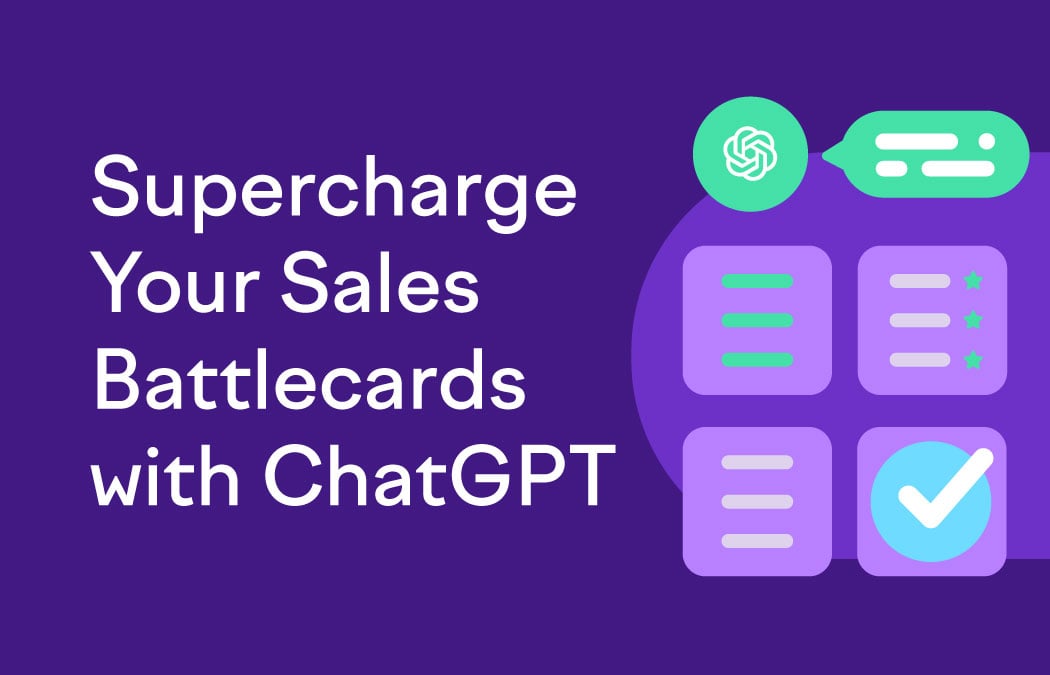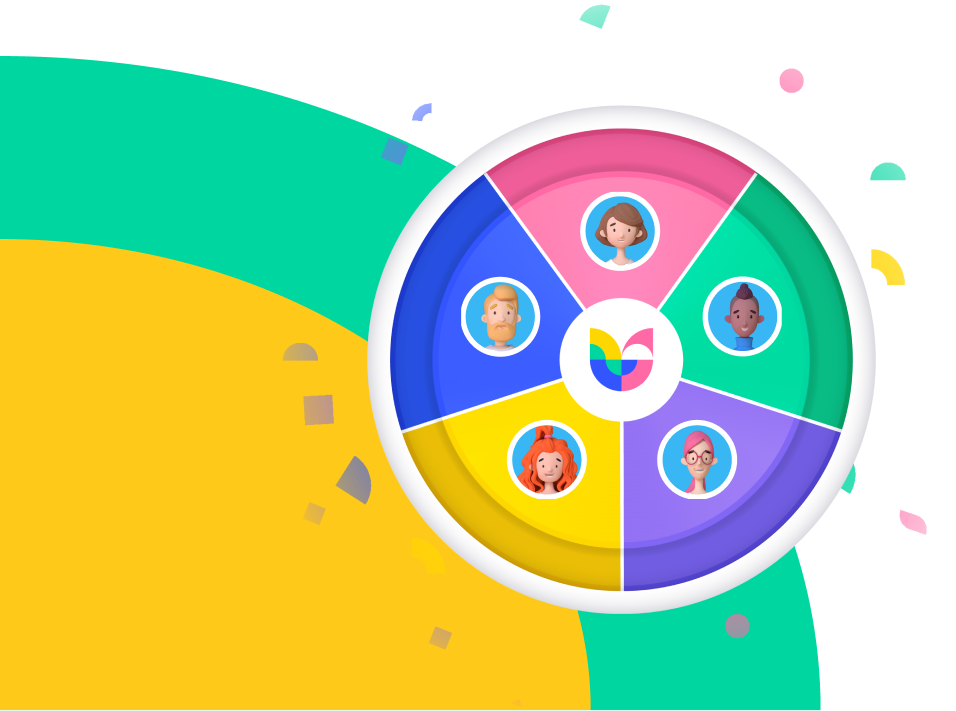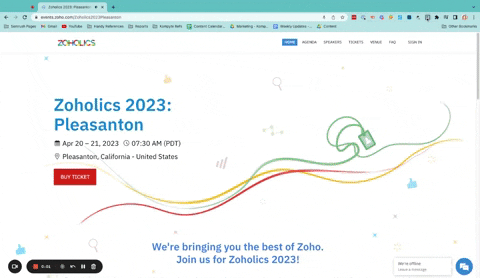How to Speed up Sales Call Prep with ChatGPT
Discover how ChatGPT can revolutionize your sales call preparation process, transforming you into a selling machine. Streamline each step of your...
See how you can use ChatGPT and other AI-powered language models to quickly craft winning Battlecards to outsell your competition.

As a sales leader, you know the importance of equipping your team with the right tools and strategies to close deals effectively.
One key aspect of a successful sales enablement program is the use of sales Battlecards - those powerful playbooks that serve as an indispensable cheat sheet during sales calls. They enable your team to answer questions with confidence, position your product as the best choice, and ultimately, close more sales.
However, creating sales Battlecards can be a challenging task. It requires collecting and synthesizing vast amounts of information and presenting it in a concise, easily digestible format.
This is where ChatGPT, an AI-powered language model, comes to the rescue!
In this blog post, we'll guide you through the process of creating more effective and engaging sales Battlecards with the help of ChatGPT. By harnessing the power of AI, you'll not only streamline the creation process but also unlock the potential to increase competitive win rates by up to 30%.
So, let's dive in and explore how ChatGPT can revolutionize your Battlecard game!
Creating a Battlecard can be a labor-intensive process that involves gathering extensive data, analyzing competitors, and consolidating valuable insights. By leveraging the power of AI, ChatGPT can help you automate much of this process.
You’ll be able to gather basic intelligence on your competitors, but where ChatGPT shines is where it quickly sifts through vast amounts of information and generates well-structured, concise summaries that can be easily incorporated into your Battlecards. With ChatGPT, your team can focus on what they do best - selling - while the AI takes care of the heavy lifting.
Sales teams often struggle with maintaining consistent messaging across various touchpoints, which can lead to confusion and lost opportunities. And when your Battlecards are written in technical sales jargon, it forces sales reps to “translate” on the fly.
If your Battlecards are not currently written in language a sales rep could literally read to a prospective customer on a call, ask ChatGPT to reword it so it sounds more natural.
While ChatGPT offers numerous benefits for creating sales Battlecards, it's important to consider some limitations and exercise caution.
ChatGPT is fantastic at processing data quickly. However, it is not always able to identify accurate or up-to-date data. Double check information generated by ChatGPT, especially when it comes to critical competitive intelligence insights.
ChatGPT is a powerful language model, but it may not always grasp the full context or nuances of specific sales scenarios, industries, or customer pain points. This can potentially lead to content that is too generic or not entirely relevant to your target audience. Review and refine the AI-generated content and tailor it to your unique sales situations and prospects' needs.
Relying on AI-generated content can raise ethical concerns, particularly around transparency and potential biases. It's important to be aware of the potential biases inherent in AI models and ensure that the content generated by ChatGPT aligns with your company's values and ethical standards.
Additionally, be transparent with your team about the use of AI in creating Battlecards and provide guidance on how to best leverage the content while maintaining authenticity and trust with prospects.
And while the information you are collecting for Battlecards is publicly available and perfectly fine to access, be aware that your prompts and the data you add to ChatGPT are used to train the model and are NOT private. Don't share anything with ChatGPT that you wouldn't want to see publicized.
Human input and collaboration remain vital in ensuring that the Battlecards are tailored to your business goals, unique selling points, and the needs of your prospects and that they include intelligence you and the team gather on sales calls.

Keeping up with your competitors is not a one-and-done project. Even if every answer from ChatGPT were current today (it’s not), the competitive landscape changes constantly. ChatGPT should not be used to power your ongoing competitive intelligence program.
Sometimes ChatGPT refuses to answer questions it might perceive as negative (example: asking for the weaknesses of a product), instead delivering a scolding. Try regenerating the response or try another NLP AI such as Bard.
Knowing how to ask is key to getting quality information to build out your Battlecards. Here are some areas where ChatGPT shines and the prompts you can use to get what you need.
This works best when your competitor is fairly well established online. You may need to add some context to a company name that is less well known or that uses a common word as a brand name. Example: "ABC accounting software" rather than "ABC."
Provide the URL for Facebook, LinkedIn, Instagram, YouTube, G2, TrustRadius, Capterra, Crunchbase, Glassdoor, Google Play, App Store, and Indeed for <competitor>.
Can you give me a brief company overview for <competitor>? I'd like to see:
Location
Date founded
Number of employees
Funding
Regions served
Brief description of their product or service
Key customers
Remember, the information only goes back to 2021 at this time. Still, it’s helpful for knowing what to look for!
Can you give me a brief overview of <competitor> go to market strategy?
What should a sales rep working at <my product> know about <competitor> product features and functionality to win more deals?
Can you create a product comparison table for <competitor> vs. <my product>?
What should a sales rep working at <my product> should know about <competitor> pricing to win more deals?
Can you tell me briefly how <competitor> positions itself in the market?
As part of a sales Battlecard, what are the 5 main weaknesses that <competitor> has vs <my product>?
As part of a sales Battlecard, what are the 5 main strengths that <competitor> has vs <my product>?
Write the 6 main objections a sales rep working at <my product> will have to face when discussing with potential customers who are considering <competitor>, also write the responses and make sure they are short, concise, and sound natural.
Note: There is no substitute for the experience you and your team have gathered, but this can be a good place to start.
Write 5 kill shots a sales rep working at <my product> can use to win more deals to <competitor> leveraging <competitor> weaknesses and <my product> strengths, be short, concise, and direct.
What are some of <competitor> customer reviews? Overall what do their customers like and dislike about the product?
This is where ChatGPT really shines - in analyzing and distilling information. You can also upload a list of newer reviews and ask ChatGPT to find common themes.
Write 3 landmines a sales rep working at <my product> can use during a demo to increase the chances win a deal vs <competitor>, be subtle but aggressive against <competitor>, and don't mention <competitor>.
I'm selling <my product> to <prospect company> Their CFO has a lot of concerns about cost savings due to the current market. What are some points I can bring up about my (enter product type) to address his concerns?
Now that you have the information, you need a place to store it and a way to distribute it so that everyone on the team has the same up-to-date intelligence and messaging.
You can keep a pdf version in a shared folder in Google Drive or Dropbox, but it is challenging to keep track of the current version and ensure everyone is using it. You can get started with our free Battlecard template here.
To truly make Battlecards useful, you’ll want a tool like Kompyte that makes it easy to pull up Battlecard information no matter what other tools you’re using.
Here, Battlecards are easily accessed inside Salesforce (or with the browser extension).
ChatGPT is fantastic for distilling data from your submission or its database, making it great to create a first pass at a new competitor Battlecard or to tweak the language for usability.
But (and this is a big but!) it cannot keep you up to date regarding your competitors’ activity. You’ll need a competitive intelligence automation tool like Kompyte for that if you want to avoid either spending too much time collecting and filtering data or missing out on something important.
You could run these prompts every month on ChatGPT, but since it’s not collecting new data, it will never change. Other NLP AI might be better able to access more up-to-date information, but nothing beats having Kompyte scour over 500 million data points daily to pull out exactly what you need to beat your competitors.
The other element to keeping your Battlecards current is to ensure your team is actively contributing insights. Get that information out of their heads and into your Battlecards where everyone can use it! Kompyte makes it simple for anyone on the team to contribute insights whenever they appear.

Anyone can add valuable insights to a Battlecard using the Kompyte extension. It's that fast!
Kompyte's Advanced AI Features now make keeping up with competitor updates even faster. Check out our full suite of AI tools here.
We’re all excited to see in what other ways AI can cut down on manual work (in fact, we're introducing new AI features all the time!) and make our lives and work more productive. Why not put it to work for your sales team now?
Discover how ChatGPT can revolutionize your sales call preparation process, transforming you into a selling machine. Streamline each step of your...
The end of the quarter is a mad dash to the finish line. Find out how to tackle some of their top competitive challenges and prevent them in the next...
For product marketers, measuring success is part of the job. Read how you can select the right KPIs based on your goals. 5 min read.
Be the first to know about new B2B SaaS Marketing insights to build or refine your marketing function with the tools and knowledge of today’s industry.